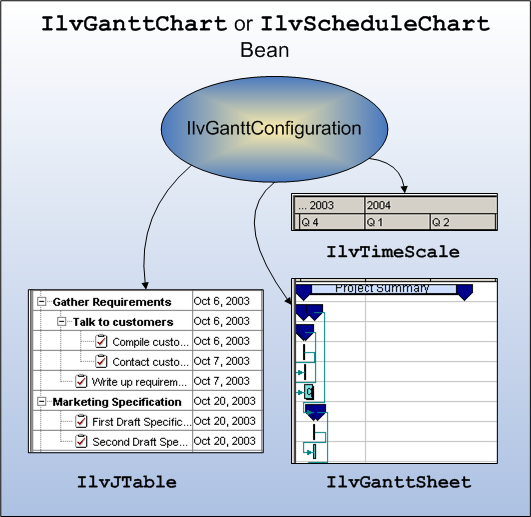The Gantt beans
Explains the way in which the Gantt chart bean and Schedule chart bean encapsulate the Gantt library.

Explains the similarities and differences between the high-level Gantt beans.

Describes the beans used to arrange and coordinate interface components.

Describes the Gantt bean properties used to control appearance.
Overview
JViews Gantt features two high-level beans, called Gantt chart bean and Schedule chart bean. Their API is based on the classes
IlvGanttChart and
IlvScheduleChart, both subclasses of
IlvHierarchyChart.
The beans encapsulate the Gantt library. Although the library can be used without the beans, you will find it easier to rely on these beans. Together with the
IlvGanttModel interface, the two beans make up the main classes for handling Gantt and Schedule charts in the
JViews Gantt API.
Both chart beans have a similar architecture and have many properties and attributes in common.
Structure
The full Gantt library allows you to arrange user interface components, such as tables, trees, time scales, and Gantt sheets in almost any layout to display the Gantt data. The coordination of the user interface components is handled by the
IlvGanttConfiguration class (
ilog.views.gantt package). The beans can be described as a predefined combination of a configuration (
IlvGanttConfiguration), a table (
IlvJTable), a Gantt sheet (
IlvGanttSheet), and a time scale (
IlvTimeScale) as shown in the following table.
Properties
Gantt beans have several properties that control their appearance, such as font, background and foreground color, and hiding or showing the table. The data model is attached to the beans through the
setGanttModel method, inherited by
IlvGanttChart and
IlvScheduleChart from their base class
IlvHierarchyChart (
ilog.views.gantt package).
More detailed properties, such as column width or column order, can be handled through the API of the table itself. To do so, you can retrieve a reference to the table through the
getTable method, inherited from the base class
IlvHierarchyChart.
The object returned by this method is an instance of the class
IlvJTable, which is a subclass of the standard Swing class
JTable. Therefore, any customization allowed on a
JTable object is also possible on
IlvJTable objects.
Similarly, detailed properties of the Gantt sheet, such as the visual aspect of the vertical and horizontal grids, can be manipulated through the API of the sheet itself. You can retrieve a reference to the sheet through the
getGanttSheet method of the bean, also inherited from the base class
IlvHierarchyChart.
Copyright © 2018, Rogue Wave Software, Inc. All Rights Reserved.
